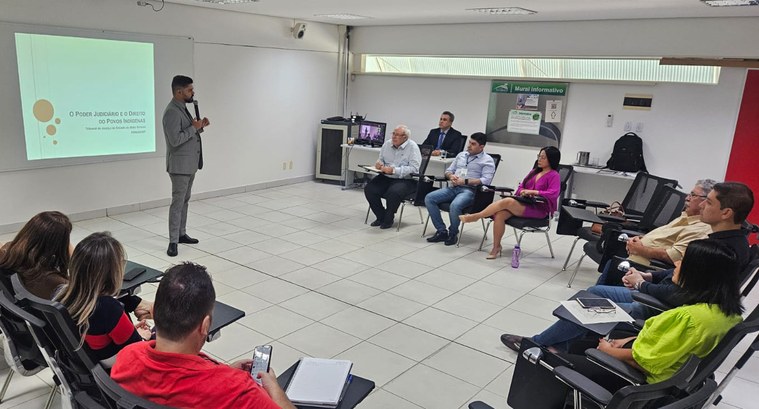
The work developed by the Regional Electoral Court of The State of Tocantins (TRE-TO), with the actions of the permanent program of Sociopolitical Inclusion of Indigenous Peoples was highlighted during a lecture given by Judge Wellington Magalhães, in the city of Cuiabá, State of Mato Grosso, this Friday, 28th.
The Superior Schools of the Judges of the State of Mato Grosso (Esmagis-MT) and the Servers of the Judiciary of the State of Mato Grosso held a training with the aim of promoting a theoretical-practical reflection on the Judiciary and the law of indigenous peoples with the theme on "The rights of indigenous peoples in the criminal sphere".
The course was given to magistrates, advisors and civil servers of the Judiciary of the State of Mato Grosso. Judge Wellington Magalhães, who is also the coordinator of the permanent program for the Socio-political Inclusion of Indigenous Peoples of the TRE-TO, pointed out that the State of Tocantins has been a reference in Brazil.
“The work we are developing with the indigenous communities of the State of Tocantins has had a very good impact nationally, which has aroused the interest of other Courts in fostering among their magistrates and civil servers a deep reflection on the rights of indigenous peoples. Today we had the opportunity to share experiences and once again strengthen the commitment of the Judiciary to the full exercise of the fundamental rights of indigenous peoples, "said the Judge.
Also according to the magistrate, "thinking about the rights of indigenous peoples presupposes reflecting civil, political and social rights, but also the constitutional guarantees of indigenous peoples deprived of their liberty as a result of the commission of crimes. It is a serious problem that has been worked on by the Resolution 287/2019, of the National Council of Justice ".
Covered subjects
Also in the program content of the course were discussed topics such as the Judiciary and the Rights of Indigenous Peoples; Indigenous Policy; International Treaties and Conventions; the right to free, prior and informed consultation; Control of Conventionality and Constitutionality; Federal Constitution and Indian Statute; and the CNJ Resolution No. 287/2019.
This event aims to fulfill the action provided for in Resolution No. 287/2019 of the National Council of Justice (CNJ), which establishes procedures for the treatment of indigenous peoples accused, defendants, convicted or deprived of liberty in the criminal sphere.
Strategic objectives
1 - Improve citizen service mechanisms
2 - Improve public transparency mechanisms
3 - Foster political education in society




